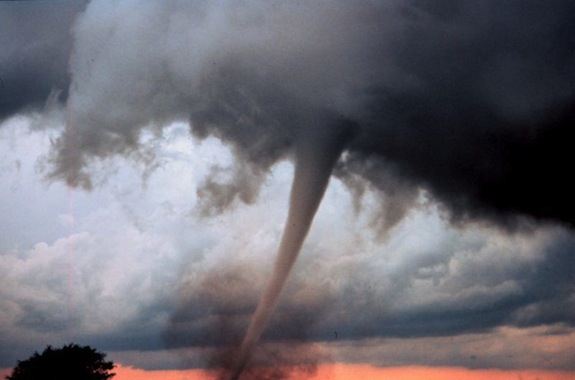This Might Be Why People Don’t Move Away From Tornado Zones
Living through a tornado doesn’t change our optimism about our chances of injury compared to other people
Every year, tornados tear through the center of the United States, often ripping towns up with them. Some years the destruction is incredible. The Joplin Tornado of 2011 destroyed $2.8 billion worth of property. That same year, there were 358 tornadoes between the days of April 25th and April 28th, killing 325 people. So why does anybody live in tornado alley, a place where year after year tornadoes slide through and wreak havoc?
Well, there are a lot of reasons, but one recent study showed that living through a tornado doesn’t change our optimism about our chances of injury compared to other people. In other words, we don’t learn from our mistakes.
The study, published in Personality and Social Psychology Bulletin, surveyed populations that had been hit by tornadoes and asked them about their perceived risks in the future. The Society for Personality and Social Psychology (SPSP) explains the results of the study:
Surprisingly to the researchers, people who lived in neighborhoods that had directly been affected by the storm – having experienced damaged windows, roofs, automobiles, etc. – were actually more optimistic for the first 6 months than people living in neighborhoods that had no visible damage from the storm.
Despite having just been impacted by a tornado, these people feel more optimistic about their chances of not being hit than those who’ve never experienced tornado damage. The study’s lead author, Jerry Suls, has some ideas about why that might be, telling SPSP that “we speculate that for a while, they felt ‘lightning wouldn’t strike twice in the same place…A year later, their optimism was comparable to the people in the undamaged neighborhoods.”
If this doesn’t make sense to you, you’re not alone. This is hard to intuitively understand for Suls as well. In fact, the whole impetus for the study came after he had his own close call with a tornado. “I had dinner as a guest in a home that was destroyed by the tornado the next evening,” he told SPSP. “It was hard not to think about future weather disasters while helping with the clean-up in the following weeks.” And yet while Suls thought a lot about the possibility of future disaster, his subjects seemed to be far more optimistic.
It’s unclear still whether this phenomenon is specific to tornado survivors. Perhaps there’s something about the midwestern ethos or the history of tornados in that region that contributes to the kinds of optimism that Suls found. But it’s also not uncommon for people to stay in all sorts of places that seem dangerous or even stupid to live in and this could be one of the reasons why.
More from Smithsonian.com:
Follow the Tornado Chasers Online
Surviving Tornado Alley
These Communities Decided Not To Rebuild After Disaster
/https://tf-cmsv2-smithsonianmag-media.s3.amazonaws.com/accounts/headshot/Rose-Eveleth-240.jpg)

/https://tf-cmsv2-smithsonianmag-media.s3.amazonaws.com/accounts/headshot/Rose-Eveleth-240.jpg)